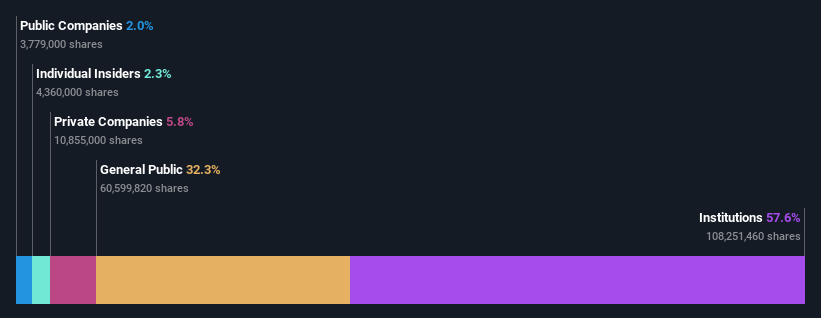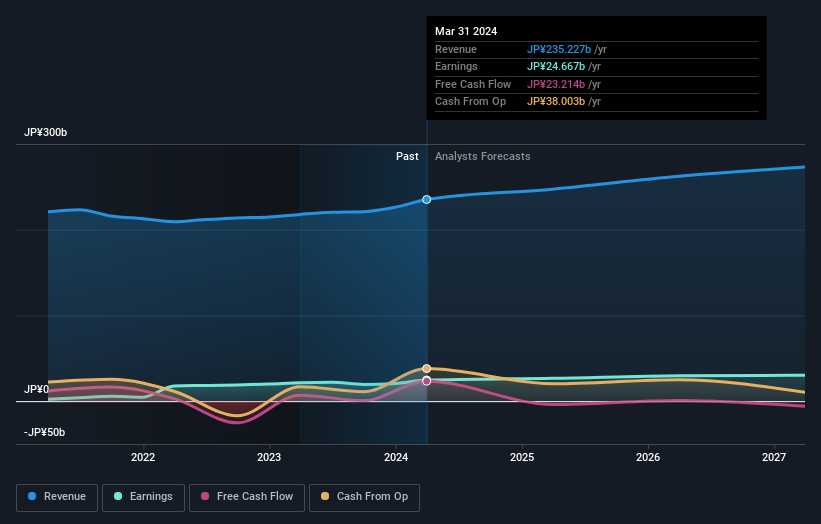Stock Analysis
- Japan
- /
- Consumer Finance
- /
- TSE:8252
With 1.4% one-year returns, institutional owners may ignore Marui Group Co., Ltd.'s (TSE:8252) 3.1% stock price decline

Key Insights
- Institutions' substantial holdings in Marui Group implies that they have significant influence over the company's share price
- A total of 13 investors have a majority stake in the company with 52% ownership
- Using data from analyst forecasts alongside ownership research, one can better assess the future performance of a company
To get a sense of who is truly in control of Marui Group Co., Ltd. (TSE:8252), it is important to understand the ownership structure of the business. The group holding the most number of shares in the company, around 58% to be precise, is institutions. That is, the group stands to benefit the most if the stock rises (or lose the most if there is a downturn).
Institutional investors was the group most impacted after the company's market cap fell to JP¥441b last week. However, the 1.4% one-year returns may have helped alleviate their overall losses. We would assume however, that they would be on the lookout for weakness in the future.
Let's take a closer look to see what the different types of shareholders can tell us about Marui Group.
Check out our latest analysis for Marui Group

What Does The Institutional Ownership Tell Us About Marui Group?
Institutions typically measure themselves against a benchmark when reporting to their own investors, so they often become more enthusiastic about a stock once it's included in a major index. We would expect most companies to have some institutions on the register, especially if they are growing.
We can see that Marui Group does have institutional investors; and they hold a good portion of the company's stock. This implies the analysts working for those institutions have looked at the stock and they like it. But just like anyone else, they could be wrong. When multiple institutions own a stock, there's always a risk that they are in a 'crowded trade'. When such a trade goes wrong, multiple parties may compete to sell stock fast. This risk is higher in a company without a history of growth. You can see Marui Group's historic earnings and revenue below, but keep in mind there's always more to the story.

Investors should note that institutions actually own more than half the company, so they can collectively wield significant power. We note that hedge funds don't have a meaningful investment in Marui Group. Our data shows that Nomura Asset Management Co., Ltd. is the largest shareholder with 8.7% of shares outstanding. With 6.4% and 5.9% of the shares outstanding respectively, BlackRock, Inc. and Asset Management One Co., Ltd. are the second and third largest shareholders. In addition, we found that Hiroshi Aoi, the CEO has 0.8% of the shares allocated to their name.
After doing some more digging, we found that the top 13 have the combined ownership of 52% in the company, suggesting that no single shareholder has significant control over the company.
While it makes sense to study institutional ownership data for a company, it also makes sense to study analyst sentiments to know which way the wind is blowing. There are a reasonable number of analysts covering the stock, so it might be useful to find out their aggregate view on the future.
Insider Ownership Of Marui Group
The definition of an insider can differ slightly between different countries, but members of the board of directors always count. The company management answer to the board and the latter should represent the interests of shareholders. Notably, sometimes top-level managers are on the board themselves.
Most consider insider ownership a positive because it can indicate the board is well aligned with other shareholders. However, on some occasions too much power is concentrated within this group.
We can see that insiders own shares in Marui Group Co., Ltd.. This is a big company, so it is good to see this level of alignment. Insiders own JP¥10b worth of shares (at current prices). If you would like to explore the question of insider alignment, you can click here to see if insiders have been buying or selling.
General Public Ownership
With a 32% ownership, the general public, mostly comprising of individual investors, have some degree of sway over Marui Group. While this group can't necessarily call the shots, it can certainly have a real influence on how the company is run.
Private Company Ownership
Our data indicates that Private Companies hold 5.8%, of the company's shares. It's hard to draw any conclusions from this fact alone, so its worth looking into who owns those private companies. Sometimes insiders or other related parties have an interest in shares in a public company through a separate private company.
Next Steps:
It's always worth thinking about the different groups who own shares in a company. But to understand Marui Group better, we need to consider many other factors. Case in point: We've spotted 2 warning signs for Marui Group you should be aware of, and 1 of them is a bit unpleasant.
If you would prefer discover what analysts are predicting in terms of future growth, do not miss this free report on analyst forecasts.
NB: Figures in this article are calculated using data from the last twelve months, which refer to the 12-month period ending on the last date of the month the financial statement is dated. This may not be consistent with full year annual report figures.
Valuation is complex, but we're helping make it simple.
Find out whether Marui Group is potentially over or undervalued by checking out our comprehensive analysis, which includes fair value estimates, risks and warnings, dividends, insider transactions and financial health.
View the Free AnalysisHave feedback on this article? Concerned about the content? Get in touch with us directly. Alternatively, email editorial-team (at) simplywallst.com.
This article by Simply Wall St is general in nature. We provide commentary based on historical data and analyst forecasts only using an unbiased methodology and our articles are not intended to be financial advice. It does not constitute a recommendation to buy or sell any stock, and does not take account of your objectives, or your financial situation. We aim to bring you long-term focused analysis driven by fundamental data. Note that our analysis may not factor in the latest price-sensitive company announcements or qualitative material. Simply Wall St has no position in any stocks mentioned.
About TSE:8252
Marui Group
An investment holding company, engages in the retailing and FinTech businesses in Japan.
Established dividend payer with proven track record.

